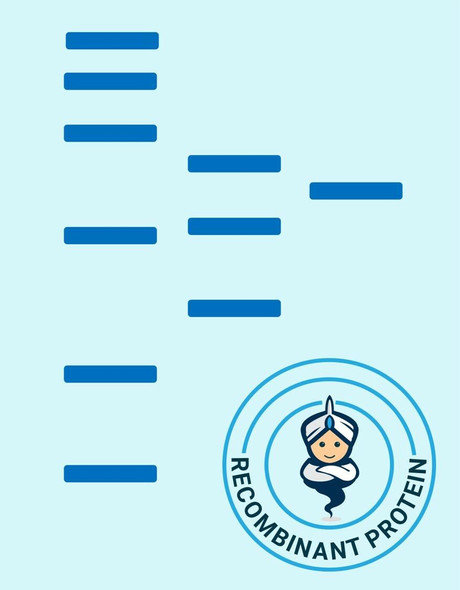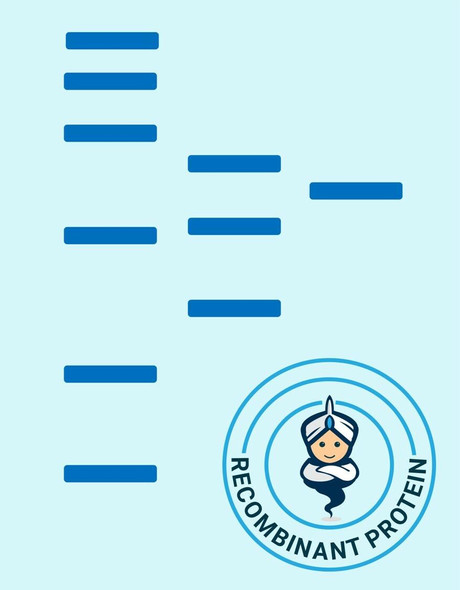Human HPGD Recombinant Protein (RPPB1825)
- SKU:
- RPPB1825
- Product type:
- Recombinant Protein
- Size:
- 10ug
- Species:
- Human
- Target:
- HPGD
- Synonyms:
- GDH1
- SDR36C1
- 15-PGDH
- PGDH
- Source:
- Escherichia Coli
- Uniprot:
- P15428
Description
| Product Name: | Human HPGD Recombinant Protein |
| Product Code: | RPPB1825 |
| Size: | 10µg |
| Species: | Human |
| Target: | HPGD |
| Synonyms: | GDH1, SDR36C1, 15-PGDH, PGDH, Prostaglandin dehydrogenase 1, hydroxyprostaglandin dehydrogenase 15-(NAD) |
| Source: | Escherichia Coli |
| Physical Appearance: | Sterile filtered colorless solution. |
| Formulation: | The HPGD protein solution (0.5mg/1ml) is formulated in 20mM Tris-HCl buffer (pH8.0) 0.1M NaCl,1mM DTT and 20% glycerol. |
| Stability: | Store at 4°C if entire vial will be used within 2-4 weeks. Store, frozen at -20°C for longer periods of time.For long term storage it is recommended to add a carrier protein (0.1% HSA or BSA).Please avoid freeze thaw cycles. |
| Purity: | Greater than 95% as determined by SDS-PAGE. |
| Amino Acid Sequence: | MGSSHHHHHH SSGLVPRGSH MHVNGKVALV TGAAQGIGRA FAEALLLKGA KVALVDWNLE AGVQCKAALD EQFEPQKTLF IQCDVADQQQ LRDTFRKVVD HFGRLDILVN NAGVNNEKNW EKTLQINLVS VISGTYLGLD YMSKQNGGEG GIIINMSSLA GLMPVAQQPV YCASKHGIVG FTRSAALAAN LMNSGVRLNA ICPGFVNTAI LESIEKEENM GQYIEYKDHI KDMIKYYGIL DPPLIANGLI TLIEDDALNG AIMKITTSKG IHFQDYDTTP FQAKTQ |
HPGD is the essential enzyme of prostaglandin degradation. 15-PGDH protein strongly decreases the biologic activity of these molecules by catalyzing the oxidation of the 15-hydroxyl group of prostaglandins to a keto group. GDH1 is involved in numerous physiologic and cellular processes, for instance inflammation.
HPGD Recombinant E.coli produced in E.Coli is a single, non-glycosylated polypeptide chain containing 286 amino acids (1-266a.a.) and having a molecular mass of 31.1 kDa. HPGD is fused to a 20 amino acids His-Tag at N-terminus and purified by proprietary chromatographic techniques.
| UniProt Protein Function: | HPGD: Prostaglandin inactivation. Contributes to the regulation of events that are under the control of prostaglandin levels. Catalyzes the NAD-dependent dehydrogenation of lipoxin A4 to form 15-oxo-lipoxin A4. Inhibits in vivo proliferation of colon cancer cells. Defects in HPGD are the cause of hypertrophic osteoarthropathy, primary, autosomal recessive, type 1 (PHOAR1). A disease characterized by digital clubbing, periostosis, acroosteolysis, painful joint enlargement, and variable features of pachydermia that include thickened facial skin and a thickened scalp. Other developmental anomalies include delayed closure of the cranial sutures and congenital heart disease. Defects in HPGD are the cause of cranioosteoarthropathy (COA). A form of osterarthropathy characterized by swelling of the joints, digital clubbing, hyperhidrosis, delayed closure of the fontanels, periostosis, and variable patent ductus arteriosus. Pachydermia is not a prominent feature. Defects in HPGD are a cause of isolated congenital nail clubbing (ICNC); also called clubbing of digits or hereditary acropachy. ICNC is a rare genodermatosis characterized by enlargement of the nail plate and terminal segments of the fingers and toes, resulting from proliferation of the connective tissues between the nail matrix and the distal phalanx. It is usually symmetrical and bilateral (in some cases unilateral). In nail clubbing usually the distal end of the nail matrix is relatively high compared to the proximal end, while the nail plate is complete but its dimensions and diameter more or less vary in comparison to normal. There may be different fingers and toes involved to varying degrees. Some fingers or toes are spared, but the thumbs are almost always involved. Belongs to the short-chain dehydrogenases/reductases (SDR) family. 2 isoforms of the human protein are produced by alternative splicing. |
| UniProt Protein Details: | Protein type:Oxidoreductase; Tumor suppressor; EC 1.1.1.141 Chromosomal Location of Human Ortholog: 4q34-q35 Cellular Component: basolateral plasma membrane; cytosol Molecular Function:protein homodimerization activity; 15-hydroxyprostaglandin dehydrogenase (NAD+) activity; NAD binding; catalytic activity; prostaglandin E receptor activity Biological Process: ovulation; lipoxygenase pathway; transforming growth factor beta receptor signaling pathway; cyclooxygenase pathway; arachidonic acid metabolic process; female pregnancy; parturition; negative regulation of cell cycle; prostaglandin metabolic process Disease: Digital Clubbing, Isolated Congenital; Hypertrophic Osteoarthropathy, Primary, Autosomal Recessive, 1 |
| NCBI Summary: | This gene encodes a member of the short-chain nonmetalloenzyme alcohol dehydrogenase protein family. The encoded enzyme is responsible for the metabolism of prostaglandins, which function in a variety of physiologic and cellular processes such as inflammation. Mutations in this gene result in primary autosomal recessive hypertrophic osteoarthropathy and cranioosteoarthropathy. Multiple transcript variants encoding different isoforms have been found for this gene. [provided by RefSeq, Mar 2009] |
| UniProt Code: | P15428 |
| NCBI GenInfo Identifier: | 129889 |
| NCBI Gene ID: | 3248 |
| NCBI Accession: | P15428.1 |
| UniProt Secondary Accession: | P15428,O00749, Q06F08, Q12998, B4DTA4, B4DU74, B4DV57 D3DP43, E7EV11, |
| UniProt Related Accession: | P15428 |
| Molecular Weight: | 29kDa |
| NCBI Full Name: | 15-hydroxyprostaglandin dehydrogenase |
| NCBI Synonym Full Names: | hydroxyprostaglandin dehydrogenase 15-(NAD) |
| NCBI Official Symbol: | HPGD |
| NCBI Official Synonym Symbols: | PGDH; PGDH1; PHOAR1; 15-PGDH; SDR36C1 |
| NCBI Protein Information: | 15-hydroxyprostaglandin dehydrogenase [NAD(+)]; 15-hydroxyprostaglandin dehydrogenase [NAD(+)]; prostaglandin dehydrogenase 1; NAD+-dependent 15-hydroxyprostaglandin dehydrogenase; short chain dehydrogenase/reductase family 36C, member 1 |
| UniProt Protein Name: | 15-hydroxyprostaglandin dehydrogenase [NAD(+)] |
| UniProt Synonym Protein Names: | Prostaglandin dehydrogenase 1 |
| Protein Family: | 15-hydroxyprostaglandin dehydrogenase |
| UniProt Gene Name: | HPGD |
| UniProt Entry Name: | PGDH_HUMAN |










